#Choice is an illusion in this instance!
Explore tagged Tumblr posts
Text

CW// Fake blood
Happy Valentine’s Day!
Hope you pick your valentine carefully~

#Choice is an illusion in this instance!#I actually had to drag my body through art block for this#I’m not really proud of it but#at least it’s finished 🧍♀️#Hetalia#axis powers ヘタリア#aph#hws#hetalia fanart#hetalia world stars#aph america#2p america#2ptalia#2p hetalia#nyotalia#nyo america#2p nyo America#hetalia axis powers#axis powers hetalia#Amy f Jones#Ashley f Jones#allen f jones#alfred f jones#ヘタリア world stars#ヘタリアaxispowers#ヘタリア#my art#valentines day#cw blood#tw blood
702 notes
·
View notes
Text
So, full disclosure, I haven't been a Solas fan before.
I am now.
And that's because of Veilguard and the many, many ways in which I felt let down by this game.
The aspect that bothers me most is the reduction of nuance and complexity.
Rook's hero's cakewalk (because “journey” really isn't the right word) is a ready-made path that offers no deviation at all and never challenges the player in any meaningful way.
Sure, you can spend some time pondering the pros and cons of saving Treviso or Minrathous. Ultimately, it makes no difference. Rook does their best, they just can’t be in two places at once.
Same with the companion character arcs. What does it mean if you decide to you turn Emmrich into a lich? For the most part, it's idle musing. Indulgence. He’ll be happy either way, there are no real stakes. Yeah, your actions do have consequences, just not the sort of consequences that make a substantial difference. It’s the illusion of choice – reduced to cosmetics.
The problems with decisions that cost nothing is that they don’t feel like an accomplishment. They also don’t allow for character growth. Rook doesn’t change, they remain static. Even the section in the Fade where Rooks faces their regrets is easy and comparatively lightweight. Varric was killed by Solas, Harding resp. Davrin died in combat and either Bellara or Neve was abducted by Elgar’nan. It’s not like Rook’s decisions actually caused these events, it’s not like Rook actually failed through a choice they had to make that turned out to be the wrong one. Everyone was there willingly and volunteered to fight the good fight. Rook’s regrets are not about real guilt, they are about feeling sad and guilty. And that – it needs to be said – is not the same thing. At all.
At the same time, the story carefully avoids any kind of true ethical dilemma.
It's not even about the lack of mean or edgy dialogue options; that’s just a symptom. The cause is the writers’ unwillingness to let realism intrude in Rook’s fairytale – the lack of anything that would require Rook to compromise on morals, or fight temptation. Rook is never faced with any sort of moral conundrum, or allowed to act out any kind of vice that realistic characters have. In its straight-path simplicity, Rook's story is apparently written for children and people who remain child-like in their yearning for simple, uncontested truths.
Of all the sorts of conflicts that a story can offer, Veilguard carefully avoids the most realistic and (in my opinion) interesting ones: Character vs. self and character vs. society, aka, politics. The game firmly refuses to go there. To the point where it creates a completely unrealistic consensus on all sides that eliminates yet another sort of conflict: character vs. character.
If Rook and their companions would talk politics, they’d all be on the exact same side. In a two party state, they’d all cast the same vote.
I am sure that there are many players who feel comforted and reassured by that fact, who sincerely believe that this is how stories should be written. That stories should reflect the world not as it is but as they think it should be. But for everyone who likes their stories a little more realistic, that lack of meaningful interpersonal conflict, that lack of real diversity which comes not from appearance but from different cultures and opposing viewpoints amounts to a frankly cringe-worthy, artificial and juvenile surface-level interaction between characters. Or, to phrase it differently: the diversity remains skin-deep and doesn’t extend to the philosophical, and even in the few instances where it does, it shies away from the political.
Which means that the only conflicts that remain are the most boring and stereotypical ones: character vs. monsters resp. the supernatural, where all foes are evil in the blandest way (Supremacist Venatori! Fascist renegade qunari! Power-hungry necromancers!). These conflicts are resolved through exploring maps and endless, repetitive combat.
The only thing that brings a bit of nuance to the game is Solas’s story. And there is an element of character vs. character in Rook’s and Solas’s relationship, but the sad truth is that what could have been a fascinating mirrored character journey falls flat for all the reasons already explained – because where Solas is a character as layered and controversial as it gets, Rook is anything but.
Solas’s story shows how even people with the best intentions and the greatest integrity are ultimately broken by what life throws at them, both by the decisions that are forced upon them and the choices they make on their own. It shows how a prolonged war is always a sunk cost fallacy: I’ve gone this far, if I stop now, it was all for nothing.
Rook’s victories, on the other hand, come without a cost – both in terms of moral corruption and in accountability. The guilt Solas bears is real. The fight against the titans, followed by his war against the Evanuris, requires compromising his own morals, one day at a time, one century after another, he’s trying to save the world yet doomed to fail. Sacrificing the spirits to win a battle after the war has gone this far? Every single war leader around the globe would make the same decision. In fact, all of them do: They do sacrifice the lives of others if it will help them win, they do send soldies into the trenches to die, whether these soldiers want to or not, and they are rarely, if ever, truthful about the reasons why.
In a certain way, the story of the spirit of wisdom turned flesh is reminiscent of the biblical Fall of Man: the original sin. Solas has fallen, and he’s broken. In trying to heal the world, he’s trying to heal himself. The burden is too heavy, the responsibility to great, the knowledge that he is responsible for all of it too devastating. Solas’s greatest conflict is character vs. self. It has the potential to be great. In a way, it is. It’s the single redeeming quality that, depending on your interpretation of what went on behind the scenes, the writers managed to salvage from the original concept of Dreadwolf or the lone pillar that withstood all their attempts to bring it down.
Only sadly, infuriatingly, in the end, that fallen hero’s ending is put into the hands of a protagonist who judges him from the perspective of someone who has never even stumbled – not because they are wiser, braver, or kinder. No, just because the writers were gracious – or cowardly? – enough to never let them fail.
The game gives Rook a moral high ground which isn’t earned in the slightest because Rook never had to walk even a quarter of a mile in Solas’s shoes. They don’t know what they would have done in his stead, they have no idea what it actually means to see the sorry shape the world is in and know that it was your hands that shaped it. And even where Rook might actually be culpable – the interruption of Solas’s ritual that freed the remaining Evanuris – anyone is quick to assure Rook that it wasn’t their fault.
Whatever regrets Rook carries, they’re born from self-doubt and trauma response. Survivor’s guilt, mostly. When compared to Solas’s immense guilt, Rook’s regrets are, for lack of a better term, insignificant. That Rook manages to face them doesn’t mean that they are more truthful or emotionally mature, it just means that Rook’s story is a tale for children and Solas’s is not.
It’s not that I’m necessarily opposed to the idea that the player decides Solas’s fate through their actions. It’s the injustice of it all that bothers me: The player is led through a game that provides a safe space for their character, one that is devoid of any interpersonal conflict and any ethical quandary. Rooks succeeds through kindness and heroism and taking their companions on team bonding exercises.
As if Solas could have won the war against the Evanuris if he’d taken the time to take his companions on coffee dates.
The juxtaposition – Rook vs. Solas – fails, simply because of this deep divide. Rook’s story is detached from reality and yet Rook gets to be Solas’s judge, jury, and executioner. On what grounds?
As I said, right in the beginning, I haven’t been a Solas fan before. But by the end of Veilguard, I was firmly, irrevocably, Team Solas, just because I was so annoyed that the narrative put Rook in a position of moral superiority. I detested my own character. Jesus, what a goody two-shoes! I was rooting for Solas simply because his story was so much more: a genuine tragedy, a study in complexity. Rook, on the other hand, remains bland, snotty, unchanged. Untried.
The thing is, I don’t believe that my reaction was one the writers had intended. I strongly feel that they didn’t mean for me to pick up on their double standard, that they expected me to walk away fully satisfied, convinced that Rook and The Team were the Good Guys because they went on picnics and petted the griffon, their final victory well-earned and just. If only Solas had had a Team and taken care of their emotional needs – he could have taken down the Evanuris with nary a scratch!
It’s all so very disingenuous.
Rook and, by extension, the player exist in a bubble of sanitized content. That is clearly deliberate. The player is meant to like it there. (In that sense, it’s only logical that they changed the title from Dreadwolf to Veilguard.) And clearly, it does resonate with a certain kind of their player base: mostly with people, I think, who would like their real life to be a bubble too and whose only experience with moral corruption is when they find it in others.
1K notes
·
View notes
Text
I think the most difficult thing that armand struggles to come to terms with (re: his feelings about marius) is very much that marius seemingly steps into his life and performs actions that are, at a superficial glance, meant to be liberatory or empowering but are unequivocally very predatory if you start to dig into the meat of their relationship.
Marius rescues armand from starvation and sexual slavery at a point in his life when armand is actively entertaining thoughts of suicide. marius sweeps in, purchases him, and transfers him from abhorrent conditions of existence to a life of material comfort, although it’s not really a safe one, but at this point armand doesn’t necessarily have the ability to have a critical dialogue about safety with himself because he’s so glad to be rescued from slavery that he ascribes divinity to marius. he also receives an allowance and he’s taught swordplay. he’s taught swordplay. but what kind of harm could a child ever cause to a 1500 year old vampire?
And the material reality is that marius is not really interested in empowering armand at all. he actively fosters an unhealthy codependency between them, he withholds information about his nature, he performs sexual acts on him even when armand doesn’t necessarily comprehend that these acts are sexual in nature. he also strategises methods that he reasons are supposed to sexually liberate armand but these instances just contribute to the overall conversation on how he grooms him. armand is 15 years old when marius sends him out to brothels “to learn how to couple properly”. do you remember that he was supposed to be forced into prostitution. marius now offers him the illusion of sexual power by allowing him to experience sexual pleasure instead of offering it to predatory customers instead. but armand also says that he doesn’t enjoy the experiences at the brothels because he craves sexual relations with marius solely, to a point where he feels resentful about being asked to participate in these acts even when he derives sexual pleasure from them. he endures the experiences because his master gives him no other choice, but it’s also in these brothels that he discovers that sex doesn’t have to be associated with pain as it often tends to be with marius.
When he returns ‘home’ from the brothels he’s perceptive enough to understand that marius really sent him to receive a sexual education on marius’s behalf and attempts to replicate these acts on him. he unconsciously takes up the role of a sex worker, but again he’s a child, and it’s horrifying that he thinks he’s harassing marius by initiating sexual relations with him. it’s also not very surprising that when he does display sexual interest in other people marius emotionally shuts him off (because these experiences were never instituted with armand’s interest in mind) and these moments shape up to be very harrowing experiences for armand - he’s been taught to crave marius’s affection and never do anything that might displease him. armand often has to beg his way back into marius’s good graces and allow himself to be subjected to corporal punishment to achieve this. it’s terrifying that one of the first ideas the boys in the villa convey to armand despite the language barrier is that their master will never hurt him.
And the alarming fact about armand’s transformation is that vampirism serves to just further reinforce this abuse, even though, once again, it might seem like an empowering act. his newly acquired powers don’t change his reality - he’s still under marius’s control the whole time. he’s also further isolated from boys his age who share his interests, and his nights with marius are insular and suffocating. the corporal punishments continue. they’re now adjusted to account for his vampirism. “usual brain jarring blow” is a term floated in the book. marius calls armand’s coffin a “crib”. he very seriously asks armand if he’s ever been cruel to him soon after he transforms him. armand’s codependency with marius is in fact further reinforced by the vampiric transformation that marius carries out. so much of armand’s initiation into vampirsm is once again rooted in sexual instruction, once again evoking patterns of behaviour that are associated with grooming. it’s very in-character for marius to teach him the fundamental principles of seducing his victims before killing them. he also advices him to develop emotionally frigid relationships and never reveal his true self to the people he cares for, further establishing marius as the most significant figure in his life, as the person he constructs his entire identity around. how was he ever supposed to turn out well-adjusted?
#I was marinating over a lot of this these last couple of days. I just didn’t expect to end up writing so much about it.#text#armand#mdr#iwtv#tw abuse#tw csa#tva
258 notes
·
View notes
Note
Do you think if reader said to Chrollo "I hate you" it would affect him?
it depends on how long reader has been with Chrollo. if it's an instance where Chrollo kidnapped reader and forced them to be with him, he won't pay it much mind. reader is powerless and at his mercy, and they're making noise because that's all they can do when faced with the abrupt change in their life
but if months or even years go by and reader maintains that position, that they'll never forgive him and never love him no matter what he does..... then it might bother him
in that case, Chrollo is faced with a choice: to keep reader with him as they are, or to control them by using one of his stolen abilities. the second option is, on the surface, the more appealing one, and nine times out of ten he'll likely choose that one if just to have the illusion of reader loving him back
but it'll always remain at the back of his head that he couldn't get them to love him without the use of his book
80 notes
·
View notes
Text



putting ‘lover’ in enemies to lovers

Pairing: neighbor!Nick Folio x reader.
CW: includes smut with mentions of unprotected sex (p in v), slight dirty talk, illusions to rough sex (biting, slapping)
Smut below the cut 🔞 Minors DNI.

Folio could argue that this was your foreplay, the bark before the bite. He doesn’t always retaliate in the ways you desire or anticipate, although he would contend that keeping you on your toes is an enjoyable aspect of your relationship.
He relishes the sound you make when he surprises you, as he did just now, his hand curled around your delicate neck, your back pressed against the wall behind. He takes your mouth in a hungry kiss. He half-expects you to slap him in retaliation—honestly, both of you are aware of the pleasure he would derive from it—perhaps that’s why it never happens. Instead, you tightly wrap your arms around his neck, your thigh lifting and wrapping around his hip. With his help, you’re seated on his waist, pinned between him and the wall.
You pull away at each other’s clothing, rough hands and sharp nails grazing one another’s skin. However, you only discard enough to access one another where you desire. He lets out a silent praise to a God he doesn’t worship or believe in for your choice not to wear something intricate beneath. This is one of the few instances where you couldn’t have anticipated this happening, and your easy to discarded lingerie proves it.
“This is what you needed, isn’t it, sweetheart?” The question is sarcastic and accompanied by a smirk forming on his lips, yet he still receives an answer in the form of your wetness dripping around his cock as he slowly and deeply sinks into your cunt. With a shuddering breath, he holds back the groan building in his throat when he feels your tight walls enveloping him completely, inviting him deeper.
Pressing his mouth back to yours, he bites at your bottom lip, hoping you feel the sting—a bit of pain to accompany the pleasure.
He fucks you slowly, the length of his cock pumping inside of you, and at times, almost pulling all the way out before filling you up completely once more. Part of him wishes to hear you beg, to push you to the brink of ecstasy over how far he’s taking you. He’s aware of your desires, just like his own—the rough, needy, hungry fuck fueled by both your lust and disdain for one another. It’s evident in the way you paw and bite at each other, aggressive and heated.
Meeting your gaze, a smirk creeps at the corner of his lips as his fingers tighten around your throat, further restricting you. “Good girl,” he practically growls, praising your ability to take him, thrusting deeply inside of you as he quickens the pace, enough to elicit a whimper from you.
You make him work for any form of praise or acknowledgment of the pleasure he provides. Even the slightest sound you make he becomes hyper-aware of, and he happily obliges each time, pushing you further until you’re too far gone, caught up in the euphoria to care about holding back.
“Fuck… do you know how good you feel?”
Each drag between your walls draws him closer to the brink of euphoria himself, his eyes battling to stay on you as they roll back and his hips thrust forward, in a steady escalation of pace. “You’re mine,” he growls, despite the trembling in his breath, there’s a hint of ownership in his tone.
He reaches for you, wherever he can with his free hand, rough and possessive to the touch, palming over your breasts and slowly, his hand descends lower, passing across your stomach, until his fingers circle your clit. “Do you understand?”
#bad omens fanfiction#bad omens smut#nick folio smut#nick folio x reader#nick folio fic#nick folio fanfiction#neighbor!folio#concretejunglefm fics
92 notes
·
View notes
Text
essay on the UFO motif in RGU (and YKA) under the cut
one of the things that makes aliens so interesting is their versatility. YKA uses the classic alien invasion trope as the set up for its narrative; aliens as outsiders, infiltrating human society and sowing paranoia. as anyone who's seen the show knows, this premise is soon subverted. fear of the other is used by the invisible storm girls to justify securitization and eventual militarization, while the main characters work to break down the self-other dichotomy.
RGU doesn't feature its UFO motif so prominently; or anyway, it's not present from the beginning of the show, but instead scattered throughout. this marginality does not make the motif any less important, however. let's take a look at the text to see how the motif itself is used.
in almost all instances, UFOs and aliens are associated with the shadow girls. the first time they're mentioned is in episode 9.
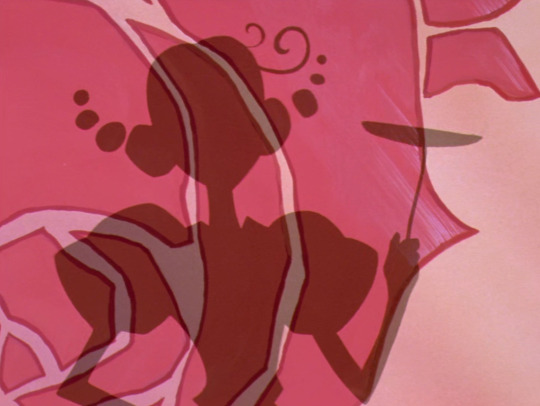
in the skit, A-Ko insists she saw a UFO, while B-Ko says it must have just been a shooting star. they argue about this for a while, until A-Ko changes the topic to disillusionment: she knows that Santa Claus, wizards, fairies, princes on white horses, and kind-hearted, true friends only exist in fantasy. but she begs to be allowed to keep her belief in UFOs.
the inclusion of UFOs in this scene may not seem particularly meaningful. the skit draws a constrast between childhood illusions and adult cynicism, notably including "true friends" on the list of fantasy creatures. with hindsight, though, this choice does seem purposeful. maybe A-Ko wants to believe in what the UFOs represent, which is more clearly spelled out as the show goes on.
in episode 12, the shadow girls list "normal things" for people to do: study normal subjects, get a normal job, fall in love normally, get married normally, have a normal family, and live a normal life. but they conclude that being normal "has nothing to do with them" and proceed to board a UFO so that they can "go back to what's normal for them."
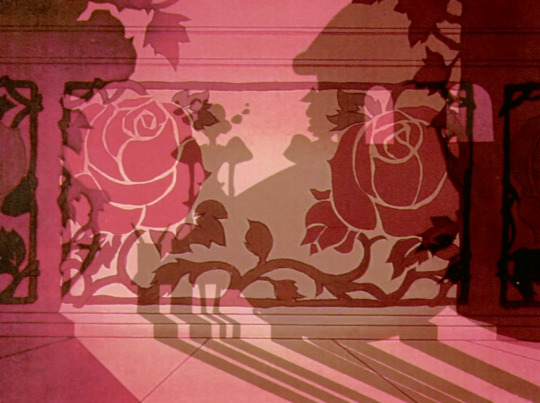
this is an obvious parallel to Utena's arc in the episode, where she rejects how society wants her to act and reclaims her own normal. but it's also telling us something about the shadow girls.
the shadow girls don't just "want to believe" in UFOs--it seems that they are aliens. they're "from Planet Kashira" according to Ikuhara; "Inhabitants of Planet Kashira" is the title of the shadow girls track on the first OST.
I think what this is telling us is that the shadow girls are outside observers. they're not natural citizens of Ohtori but exist at a remove from it. they can interact with the story, but they're a constant reminder that something beyond it exists--that the "rules of the rose crest" are not the laws of the universe.
from episode 13 on, the shadow girls put on their plays after returning to earth from their UFO. episode 24 ends with an encounter between Suzuki, Yamada, Tanaka and the UFO. we see the "monkey-catching-robot" again; once it successfully bags its prey, it enters the craft and flies away.
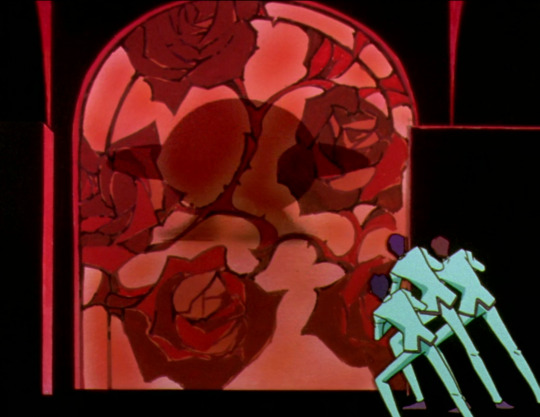
I could probably provide a reading of this scene if I tried, but mostly, I think it's there to round out the Black Rose arc. it's rather tongue-in-cheek; the UFOs are a part of the silly side of RGU. this eccentricity is humorous, but in my view also tied to the theme of individuality, which requires unapologetic strangeness. there's also something to be said for RGU's use of the inexplicable and uncanny, which often have a far deeper impact on the audience than concrete story elements.

in the final arc, the shadow girl plays begin with their UFO crashing into the chairman's tower. this is as clear a metaphor as one can hope for: the shadow girls and their alienness are a destabilizing force. maybe they're not revolutionaries--the crash appears to be accidental--but their randomness, their strangeness, their lack of propriety are a threat to the order, the masculine rule represented by Akio.
that's about it for the shadow girls. but as I mentioned, aliens are brought up in another context: the episode "Nanami's Egg."
the line "Nanami's some kind of space alien" is rather famous, and that part of the episode isn't hard to read. she's worried that she's seen as a freak, an other, by her peers. however, we also get a return of the motif at the end of the episode.
after abandoning her egg, Nanami is unable to put it out of her mind and runs out into the night to find it. she sings and dances with it, but after a bedtime conversation between Utena and Anthy, the show cuts back to Nanami, now bereft of her egg again.
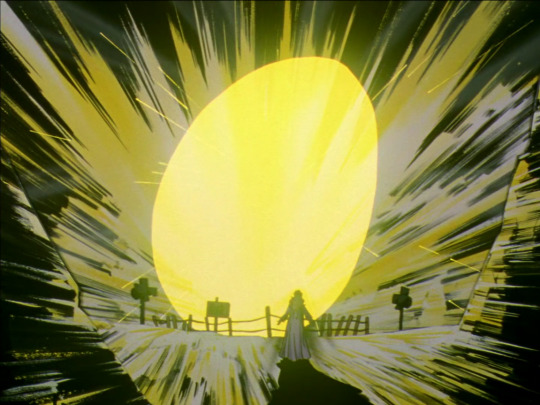
she finds it, grown 100 times larger, propped up in the woods. she promises never to abandon it again, but it seems not to forgive her, shooting strange beams at her in attack. then it fades and lays before her, cracked open.
I think this scene is adding a new dimension to the egg metaphor: in the final moments of the episode, the egg becomes a symbol of Nanami's self. she tried to be rid of it, as she killed the cat--but just as she did then, she found herself regretting it. but she's unable to forgive herself for it, feeling that she's betrayed herself and lost something very important for the sake of a false normality.
to finish this essay, I'd like to reflect on how the motif of alienness is reflected in the larger themes of RGU. in the episode 11 commentary, Ikuhara wrote the following:
I tried to live true to myself. “You’re just like an alien,” someone said to me one day. They must have been telling me, “You’re not normal.” In other words, apparently “living true to yourself” means “living as an alien.” And so I became “an alien all alone in this world.”
alienation, individuality, and deviance are all major themes in RGU. the shadow girls present a positive image of what it means to be an alien: they are carefree and unconstrained. however, for the other characters, being an alien--an individual--is not so easy. it sets them apart from the social order and may even put them in danger. therefore, RGU depicts the defiant joy of deviation, along with the pain that often accompanies it. individuality may be a threat to the system, but that's exactly why it's difficult to achieve.
finally, "alienness" serves as a great metaphor for self-other encounters, as I've touched on throughout this essay. if we are individuals, that means we are fundamentally separate from one another, because we cannot experience each other's experience. thus, we are each of us aliens to each other.
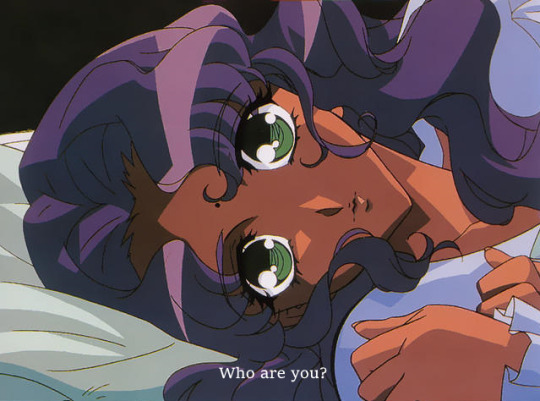
Anthy asks Utena this question as if she truly does not know, as if Utena is some mysterious being encountered in a dream. they are drawing closer together, and so the fact of their alienness is only becoming more pronounced. it will take the rest of the show to find out if contact is possible.
120 notes
·
View notes
Note
I HATE YOUR WRITING TIPS, ONE MORE POST AND SCREW IT, IM BLOCKING *AND* REPORTING YOUR PAGE. IM FED UP WITH THESE INEFFECTUAL WRITING TIPS. HOW DO YOU THINK EDGAR ALLEN POE, AND EVEN SHAKESPEARE WROTE? THEY DIDNT HAVE TUMBLR AND NO 'cute little writing tips for your help!' I DEEM EVERY MODERN DAY WRITER A CHEAT AND I HOPE WHATEVER YOU'RE WRITING FAILS. YOU IMBECILE OF A WRITER.
Hi, thanks for asking! Writers like Edgar Allen Poe and Shakespeare used many techniques in their writing which might help you out. Here are a few tips:
Use metaphors: Employing figurative language can help paint vivid images in the readers' minds and facilitate the comprehension of more complex themes and ideas. For example, in Romeo and Juliet, Shakespeare compares love to a rose—while it is lovely to the eye, its thorns can cut deep.
Choice of impression: Know what you want the desired effect of your writing to be in advance. Having decided the impression you want to leave on your readers before you start can help when figuring out the tone and conflicts throughout the story. Poe, for instance, focused mostly on the gothic genre with themes of death that inspired feelings of terror, despair, and suspense.
Know your audience: Who are you targeting? Determining factors such as the age range your work is for and what message you want to leave them with is crucial so that readers find your writing relatable and engaging.
Choose the setting wisely: In Poe's own words, "a close circumscription of space is absolutely necessary to the effect of insulated incident." Though the setting—of the entire book and for each scene—is often viewed as trivial, or at least of secondary importance, it is important to know why you're putting the characters where you are.
Use soliloquies: A soliloquy is a dramatic monologue in which a character speaks their thoughts aloud, typically while alone on stage, revealing their inner feelings to the audience. This can often be seen in Shakespeare's works, such as in Hamlet, where the title character begins with "To be, or not to be: that is the question," contemplating life and death.
Thank you for voicing your concerns! I wholeheartedly agree that I am not a real writer, merely an illusion. This is the last you'll see of me, I'm afraid. Feel free to ask any more questions, and thanks for 1800 followers—almost to two thousand! Love you all ❤
Previous | Next
#ask#anon hate#writeblr#writing#writing tips#writing advice#writing help#writing resources#creative writing#deception-united#goodbye everyone#it was nice knowing you#abandoning my blog
199 notes
·
View notes
Text
Gwynevere is not the Queen of Lothric
It's quite frustrating how widespread this belief is, and it's in no part the fault of both a certain localization choice AND the popularization of the theory through big lore guys, some even claiming to work with the Japanese script itself...
I am here to make an argument against this theory with everything we know from Dark Souls 3 itself. So first of all, let's see all the information we have about the Queen of Lothric.
She was wed to Oceiros and gave birth to all his heirs. This includes Ocelotte, which is when she left.
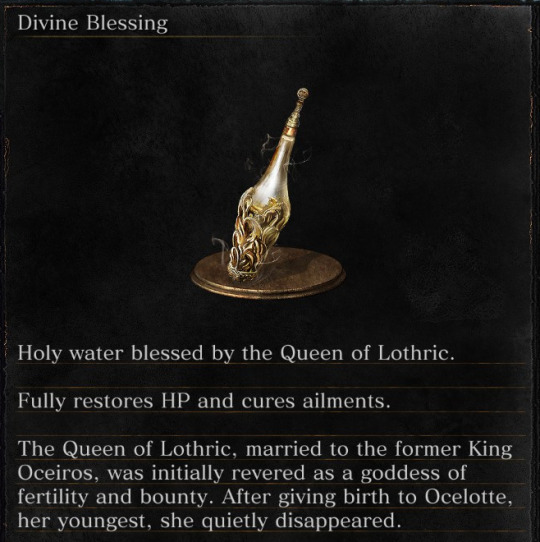
(We'll get back to the "initially revered as a goddess of fertility and bounty" bit, trust me...)
She had an interest in the Unkindled. She is also very connected to sorcery and magic.
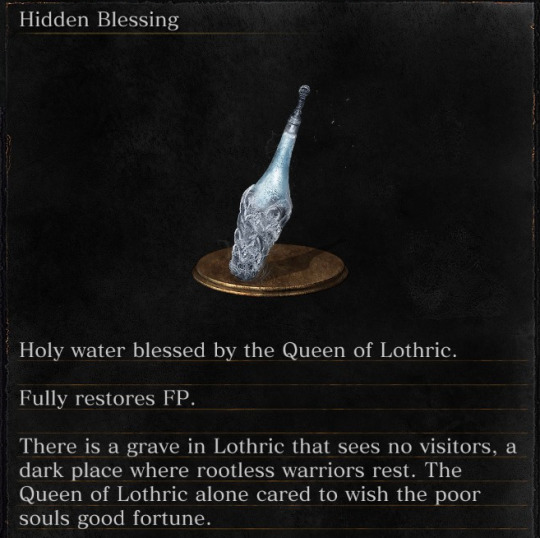

She had a holy maiden who was her direct daughter.
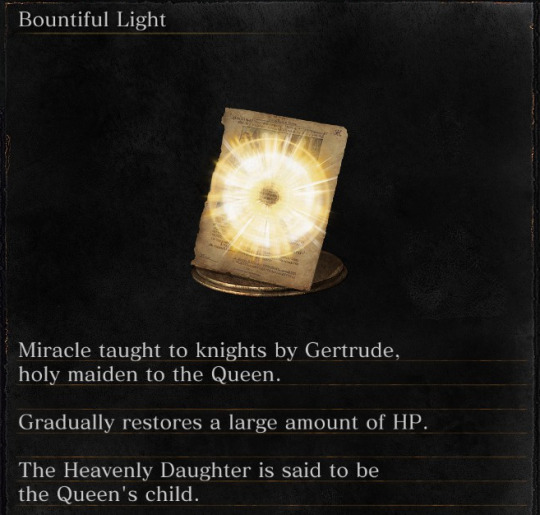
Now, I won't say that I can't see why some people decided it made sense for this character to be Gwynevere... I mean, they straight-up say she was once revered as a goddess with her same characteristics! But here is where things become less cut and dry...
In Japanese (I take the text from this rather useful page [x]) the description implies something different.
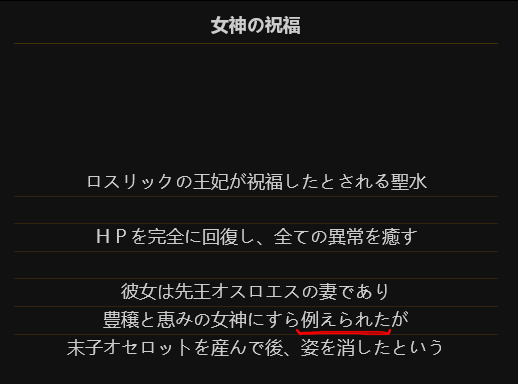
The description contains 例えられた, which means "to compare" and other similar concepts

It doesn't mean that she was revered as a goddess of fertility and bounty like it was localized, but that she was likened to one. Actually, THE one, as in Japanese it seems to specify it's referring to someone specific too. It gives off a completely different connotation from the sentiment we got in English!
Another thing worth mentioning is that two of the already few items that directly talk about her connect the Queen of Lothric to magic, which seems to imply she had a natural interest in this sort of thing, rather than being something Oceiros imposed on her. It's an affinity that Gwynevere never displayed.
Now, let's see what we are told of Gwynevere in Dark Souls 3.
She left her home and had many divine children.

She was a "princess cherished by all".
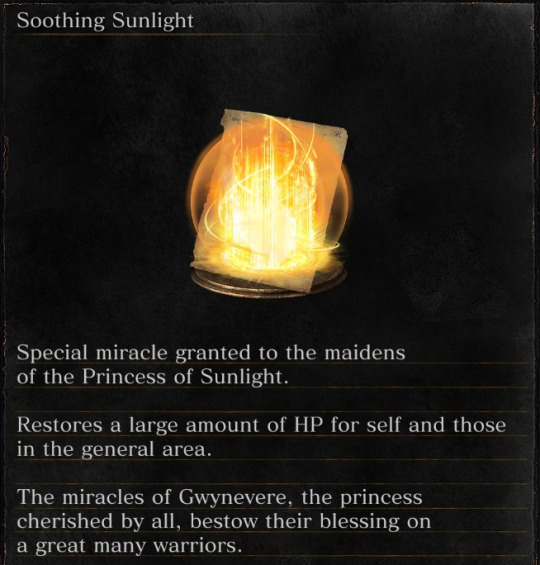
She was really loved as both a wife and a mother.
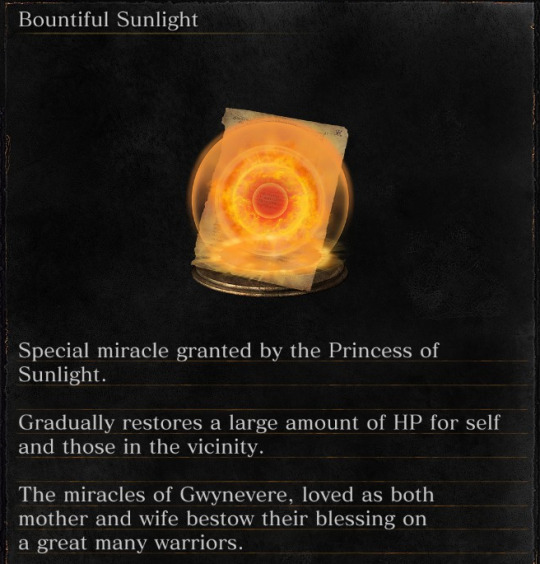
She is still an important part of the Way of White and the Darkmoon Sect.

Her title and figure are known by the people of Lothric, even during the kingdom's end.
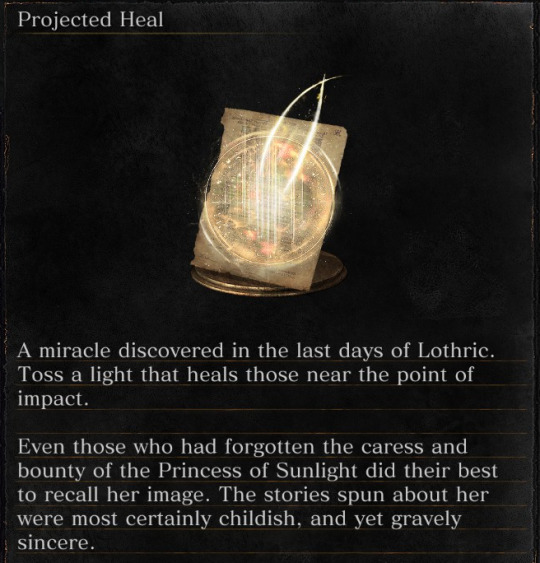
When putting all of this together, Gwynevere seems rather overtly characterized as a kind, loving figure that was cherished and loved in turn. A great mother who raised each of her children with love, and is remembered fondly to this day... and most important of all, she is still talked about. Her name, titles and domain as goddess are not forgotten, obscured, or omitted.
... which leads me back to the Queen of Lothric, who certainly wasn't a Princess of Sunlight, as her title implies. Heck, Gwynevere certainly wasn't a queen either, according to these descriptions, when it would be her most recent role in history if they are truly the same person.
The one time Gwynevere is referred to as a queen in the entire series is by her illusion in Anor Londo.
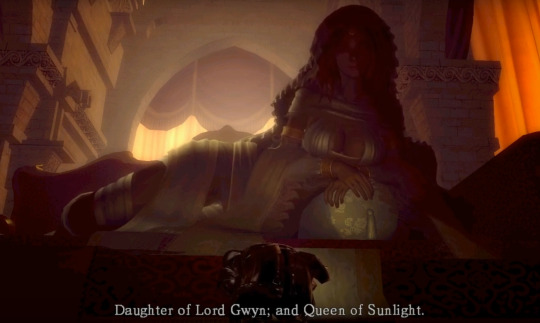
This was created by Gwyndolin and likely voiced by him too (or at least "programmed" to say certain things), which puts its trustworthiness into question... and that line is further rendered obsolete by both the descriptions in this game (remember how she is "the princess cherished by all"?) and in Dark Souls 1 itself too, where every other item that's connected to her mentions her as a princess. Even her own covenant does!
But back on topic... isn't it strange that the beloved Gwynevere would go unnamed in any instance where she is described as leading the kingdom she supposedly presides over? A kingdom that clearly remembers her and holds on to her memory as an almost fairytale-like figure to boot! Heck, why would they invent tales about the faded image of a Princess of Sunlight when their Queen was right there, sharing the same blessed history? Unless, of course, she doesn't... and so their monarch lacked the same holy, comforting presence.
If the Japanese description saying she was simply likened to this absolutely cherished woman didn't convince you, then perhaps the inconsistency with which this game would decide to omit someone it's otherwise not really afraid to name should strike you as odd.
But sure, the fact she could create Divine Blessings is quite odd in its own right. This HAS to be a hint towards Gwynevere, no? Well, I do believe it is, really! Just not as a confirmation of the Queen's true identity. A more likely explanation is that it hints at her divine descent... and she wouldn't be alone in this, since both the Dancer of the Boreal Valley AND Rosaria are implied to be just that.
Soothing Sunlight and Bountiful Sunlight are made out of their respective souls.

The Dancer herself has even more overt connections to Gwynevere, as she is described as a direct descendant of the old royal family.
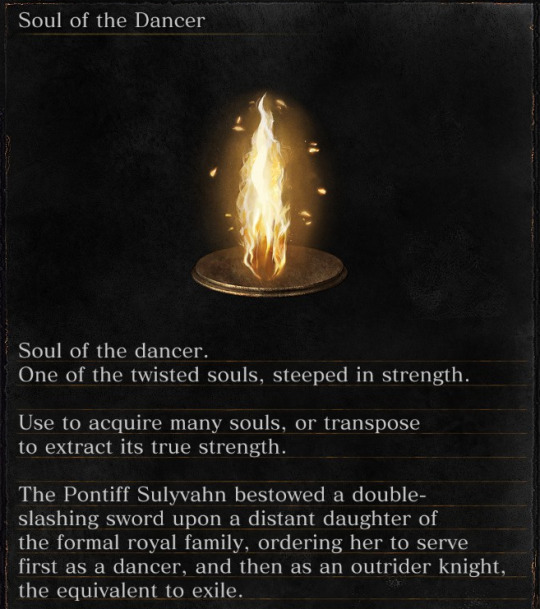

And now, recall one of the traits that this game REALLY wants us to focus on for Gwynevere. How she was the beloved mother of many, MANY children that she raised herself... and now here we have two of her descendants, likely children of her own children. So who is to say there isn't a third one? The one who would become Queen of Lothric.
But perhaps you'll want to mention Gertrude as a counterpoint. After all, she is known as the Heavenly Daughter, and Gwynevere was said to have given birth to and raised many heavenly children. She also knows Bountiful Light, which is a weaker version of Gwynevere's own miracles. And these are fair observations, honestly... however, there are some more arguments against both points.
First, let's look at Bountiful Light. While a miracle clearly reminiscent of Gwynevere and her maidens, it is decidedly weaker... which in itself is quite odd if she was a direct descendant of THE goddess who had devised these blessings to begin with. Even the maidens of the goddess knew the genuine versions of her own miracles, wouldn't it be odd that her daughter would not? Especially since both Rosaria and the Dancer have a direct connection to those stronger miracles.
Secondly, let's look at the topic of the "heavenly children". Once again, the Japanese version tells a different story.

In Japanese, Gwynevere's children are 貴い子たち, which can mean "precious/valuable children" or "noble/sacred children".

Meanwhile, Gertrude is called 天使の娘, which means "the Angel's Daughter". It also seems to state that she became this later, likely when she met the Angel that gave her a holy revelation, so it wasn't even how she was born. Not that it matters, since the terms don't even match in Japanese.
And it's the topic of children that I want to quickly touch on for my final point...
Gwynevere's characterization within Dark Souls 3 has been nothing but praise for her good nature, soothing personality, and kind heart as a mother who raised each of her children with love and care.
Looking at the Queen of Lothric, on the other hand, can you really say the same? Can you really say they are the same person?
The woman who would willingly marry a man like Oceiros, the current patriarch of a family obsessed with creating the perfect sacrifice?
The same mother who would have Lothric just so he could fulfill the purpose of dying for the Flame and nothing else, even handing him off to a wet nurse rather than raising him herself?
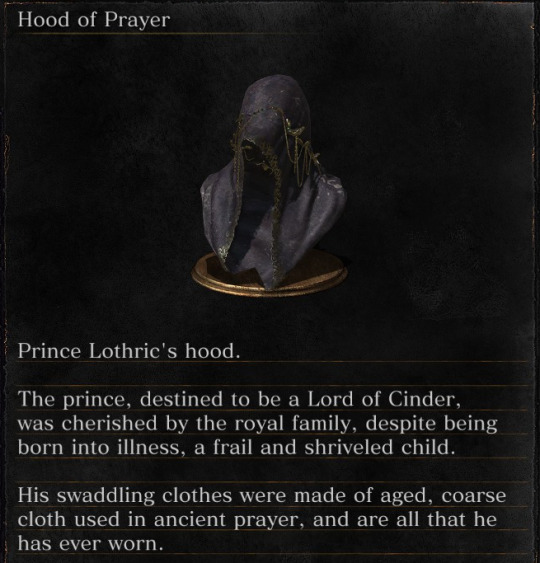
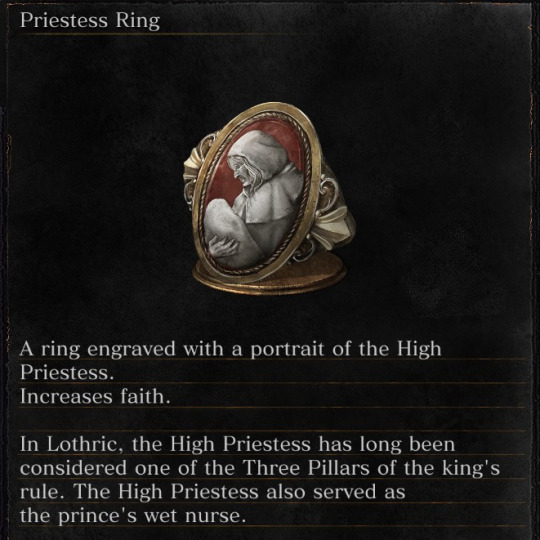
The same mother who let her daughter get caged and shrivel up once she became too heretical for the kingdom's tastes?
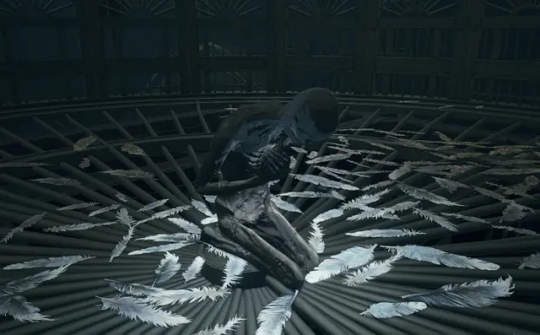
The same mother who took part in the creation of Ocelotte, with nothing implying she was unwilling or opposed to it, and who then abandoned him with his deranged father to leave for parts unknown?
I don't want to claim that the Queen of Lothric is a horrible person or anything. I don't know the intricacies of her situation, after all. But none of her characterization, actions, or reactions fit the Gwynevere established in the same game as her.
-
I wouldn't be as passionate about bringing counter-evidence to the theory if it weren't for the fact that it's treated as absolute, uncontestable fact. There is plenty of room for speculation, and many things that don't add up under closer scrutiny.
She is in an even worse spot than Caitha when it comes to being completely erased from the narrative to prop up a fan favorite. At least with the Goddess of Tears, people say it's a theory and treat it as such, even if they are convinced of its veracity. For the Queen of Lothric, it's almost considered a no-brainer that she is Gwynevere, and YOU are weird to try and claim she isn't.
I hope I gave a fresh perspective on the topic. I think it's about time this obscure character starts getting some love or at least recognition of her own. And if you struggle with the fact she doesn't seem to have a design, not to worry! This statue in Irithyll might actually be depicting her! If you want it to, of course.
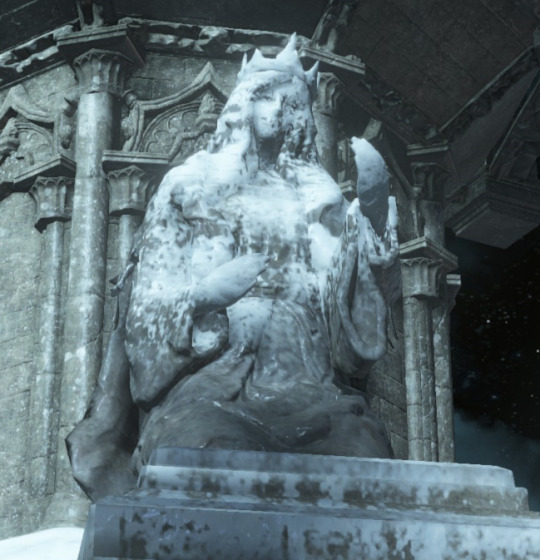
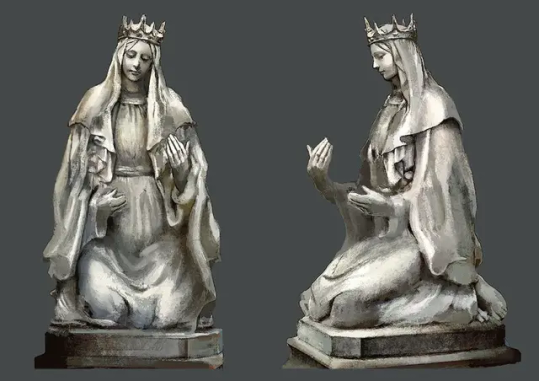
This woman does NOT look like Gwynevere at all lol, and we even have a painting of her in this very city to compare her to...
I don't understand how people could confidently say this statue is 100% her just because of a ribbon...


Like, sure, they are certainly alike! But it's also what I'd expect from someone who is most definitely a descendant. Some stylistic choices were bound to shine through.
#dark souls#dark souls 3#queen of lothric#gwynevere princess of sunlight#gertrude the heavenly daughter#lothric younger prince#oceiros the consumed king#I just want justice man lmao#the gwynevere theory is just too widespread.......#but like. look. the characterization is just too different#in the span of the same freaking game#also keeping her anonymous in one set of descriptions-#while calling her by name and titles in others...#it feels purposeful. these women are not the same woman#I rest my case... and my eyes...... it's late#val-post
30 notes
·
View notes
Text
Mysterious Ways: Destiny and Prophecy in Arc 2
So... this started out as a look at the tension between fate and free will that drives Callum's arc in s7 and how it is reflected from Aaravos's side, but I kind of got distracted. That's all still in here, at least kind of, but I want to talk about some other stuff, first. Primarily this: there's a big shift in how this story approaches the concept of destiny for s6 and s7.
Outside of the very specific instance of "destiny is a book you write yourself," both arc 1 and the first half of arc 2 are much more focused on free will as breaking a cycle whose continuation is demanded by historical, cultural, situational, and emotional pressures—recognizing that it's possible to choose a better future, regardless of what you or anyone else has chosen in the past.
To introduce destiny as a force beyond those pressures—one that says certain future events are so immutable as to be foreseen years or centuries in advance—is a significant change in the playing field. What s6 and s7 add to the story is a power that could take all the hard-won choices of love and forgiveness and freedom that were built up in s1-s5, and render them powerless.
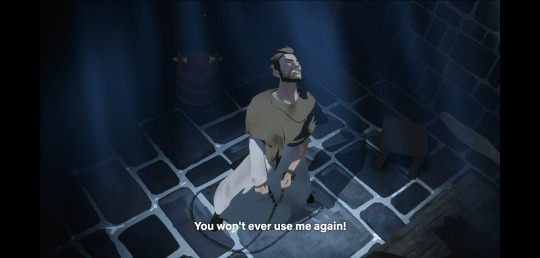
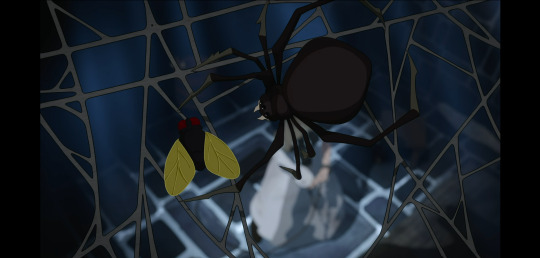
Yeah, it's... a turn. Not one that doesn't make sense, however. The narrative is also shifting away from the (largely resolved) Humanity-Xadia conflict, with the freed Aaravos emerging as an antagonist on a much greater scale (ha) than he has been operating thus far as a manipulator. In a lot of ways, s6 and s7 are meant to make the heroes feel small (ha) again, as they are caught up in a war between beings of much greater power.
All That Prophecy Rubbish: Season Six's Narrative Pivot Toward Destiny
So outside of Callum's dream in s2, the concept of destiny as an actual force that can be perceived via prophetic visions (rather than as a representation of the illusion that choice is not possible) doesn't really appear until Callum and Rayla reach the Starscraper. We immediately get hit with a prophecy that anticipates deliverance by a "chosen two"... which, after initial reluctance and skepticism, Callum and Rayla go on to fulfill.
There's not really a lot of time taken to truly examine the ramifications of the entire concept—the narrative is itself a little coy on whether Callum and Rayla actually are the chosen two (and what that might mean), but the audience is meant to follow Callum's thought process as he becomes increasingly convinced that not only can he and Rayla meet the terms of the prophecy, they are the only ones who can. He winds up being both right and wrong... they do fulfill the prophecy, but not at all in the way he had laid out.
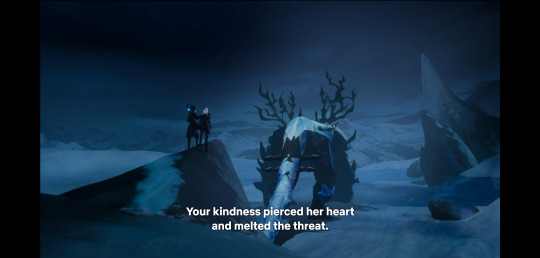
This sudden introduction of not just destiny, but prophecy—i.e. the idea that the course of events is so immutable as to be revealed ahead of time—is immediately followed by Kosmo's time-blindness and reading of Callum's "star" as shrouded in darkness. Callum has been fatalistic about his dark magic corruption before, but this actually takes him to the brink of giving up—until/unless Kosmo intervenes by altering his own actions in order to manipulate Callum's. As a follow-up to "destiny is a book you write yourself," this is all kind of insane.
Then, to top it all off, we have the ultimate reveal of the cosmic order and its defenders, who—along with Aaravos—foresaw the end that he now seeks to ensure.
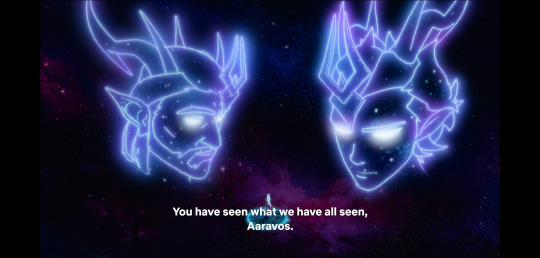
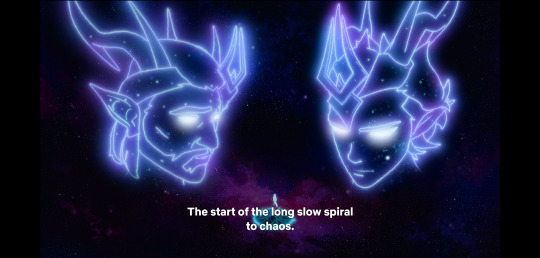
It is Only Fitting: The Nature of Prophecies as Seen in Seasons Six and Seven
Season 7 doubles down on what s6 started, opening with Kosmo reading a prophecy from the starweaver spiders' tapestries and the implication that they are a neutral source. Kosmo is certain that what he sees there is "what will be," and cannot be avoided or prevented:
Death Alive In darkness thrives They wither and writhe In Sun's true light But the Fallen One brings Eternal Night
It's a pretty bullet-point description of what happens, so the starweaver spiders are apparently pretty accurate. Not great poets, though.
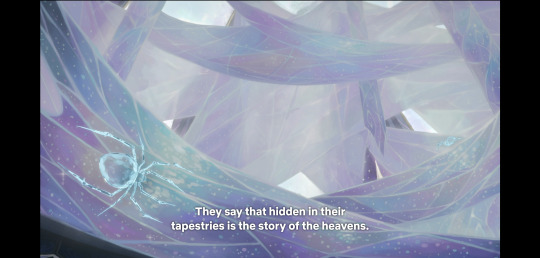
Kosmo also gives Astrid some unknown number of additional prophecies before she leaves, with the caveat that (as she later repeats to Callum) they "might not all be true." We know that Kosmo is familiar with visions of future events that don't come to pass, and even deliberately averted, because he does exactly that in s6—he sees an undesirable future play out, and changes it to a more desirable one by altering his own action at a critical moment.
The most significant of these prophecies, revealed to us much later, describes the climactic events of s7:
When the hour turns black, one with dark eyes will save us all... and choose his own end.
This prophecy is more similar in format to the one about the chosen two, which the Elder prefaced as foretold by "the Timeblind." Are these two different kinds of prophecies, one a factual description of fated events—"the story of the heavens"—and the other a more interpretive possibility to be claimed or denied?
If there is an unbiased prophecy provided by the stars that details an immutable destiny, presumably the Startouch elves—the Great Ones, the stars themselves—would have access to it. But who knows? Plenty of magical creatures have powers granted by their arcanum that elves don't. Maybe the spiders are special.
We don't get the phrasing or details of the prophecy shared by Aaravos and the cosmic council, only that they have all seen it, and that it indicates humans receiving magic as the inciting event for some kind of doom.
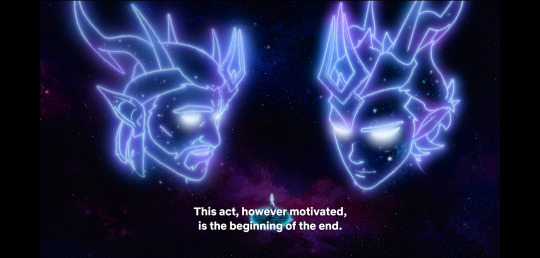
Interestingly, it also seems to be a fate that the council felt could be averted—they appear to not know how or when it would occur, and attempted to exert whatever control would prevent it. Punitive justice of the kind they insist on for Leola is generally argued as a deterrent to others who might repeat the crime—but what is there to repeat, in this case? The events that stem from humans receiving magic presumably cannot be stopped or prevented after they begin, whether Leola lives or dies. If not, why was it even a prophecy?
Similarly, Aaravos makes what he perceives (or frames) as the sacrifice of enduring "an eternity of pain" in order to ensure that the doom they foresaw comes to pass, which suggests that he believes in the possibility that it was never really, truly 100% certain that it would happen. His vengeance is not just delivering the fate the council feared, but also them knowing that all of it was his doing, not the unknowable hand of destiny. He wants them to appreciate the irony of their cosmic order unraveling as a direct consequence of their cruelty in trying to avert that fate.
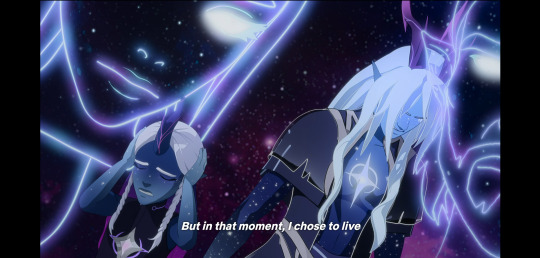
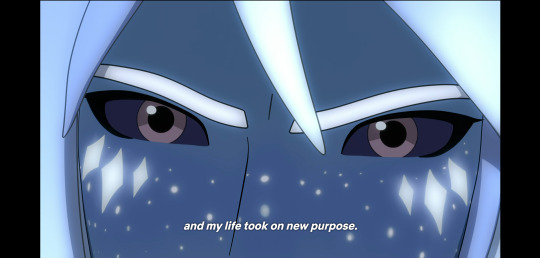
This puts him in the position of acting as an agent of destiny to bring about the prophesied future in a subversive way—setting up fulfillment of fated events in ways that further his own plans. However, I think this also gives him a reliance on the concept of destiny that then drives a lot of the tension between him and the rest of the cast around that theme. His arrogance is in believing that there is no end in which he does not eventually win—after all, everything he's pursuing is, in some way, already destined to happen.
(His downfall, naturally, is in his planned fulfillment of destiny being twisted back out of his hands in ways he doesn't expect.)
It's Not About You, Is It: When Prophecies Collide
Anyway, let's go back to Kosmo's prophesy for the climactic events of s7:
When the hour turns black, one with dark eyes will save us all... and choose his own end.
The audience, at this point primed by several episodes of Callum's agonizing, accepts (as does Callum, himself) that it refers to a final choice to end the threat of Aaravos through dark magic, the only means now available to him. As with the prophecy of the chosen two, it is then fulfilled in an unexpected manner—it's the corrupted shade of Avizandum who takes back his free will and delivers the killing bite, accepting a second death to save (at minimum) his son.
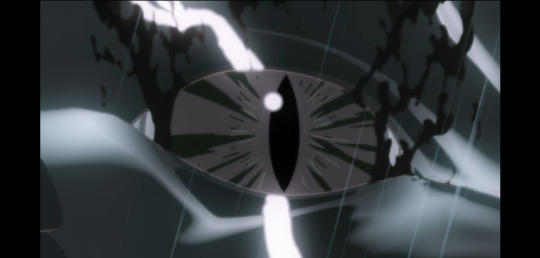
One feature that stands out about this prophecy is that it has a distinct point of view—presumably that of the living population of Xadia (which includes Kosmo), who it claims will be saved from doom. So is this a vision accessed only by Kosmo, or is it visible to everyone with the equivalent of time-blindness? What if Aaravos foresaw the same thing, or something similar?
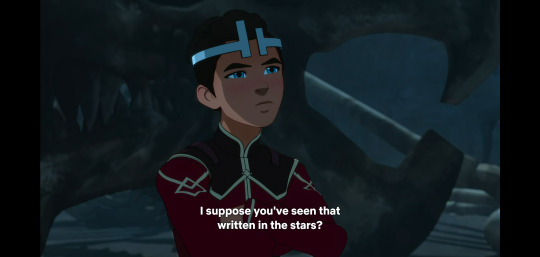
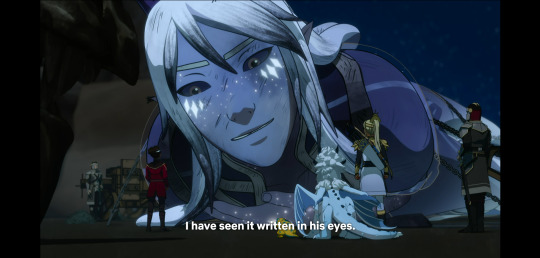
When given Kosmo's prophecy, both the audience and Callum expect the fulfillment to be that Callum will sacrifice his life (choose his own end) after using dark magic (one with dark eyes) to successfully imprison Aaravos (save us all). Aaravos's behavior and reactions suggest that he at least knows that a dark mage will stand against him (and who would that be, besides Callum), and make a final sacrifice. Even if he does pick up on the "will save us all" aspect, it's quite vague—"us" may or may not include those currently fighting, and they could be saved from eternal night, but not from Aaravos himself. It's entirely possible that a valid fulfillment is Aaravos taking Callum as a vessel. It's not entirely clear what Aaravos would actually do with that situation, but he's willing to count it as a win.
What he's not willing to count as a win is being imprisoned again, and the only time he has a negative reaction is when it's revealed that Runaan, not Rayla, is prepared to kill Callum and prevent Aaravos from escaping the spell by taking him. It definitely seems like he's got some other information that he's drawing on, here—maybe another prophecy—that makes him confident that Rayla will be unable to kill Callum. When Runaan is removed, even though Rayla takes his place, he's not worried by Callum beginning the spell. Destiny, as far as he's concerned, is back on track.
Now, we know that the prophecy both Callum and Aaravos are focused on is only one out of some unknown number that Kosmo gave to Astrid, all of them less certain than the "Death Alive" one from the starweaver spiders. Aaravos is known for contingencies within contingencies, so if he's factoring one prophecy into his plan, he's probably factoring in several.
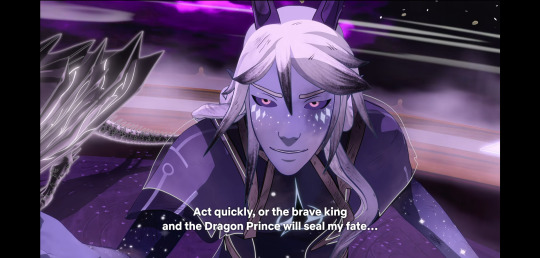
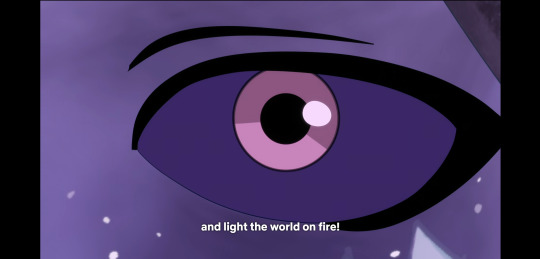
When Ezran and Zym appear, Aaravos goes from visibly angry—possibly cornered—back to being satisfied with the way things are progressing. He purposefully set things in motion for Ezran to arrive with the Novablade (i.e. Aanya is correct, it was a trap), because another thing he's willing to count as a win is his death taking all his enemies with him. The archdragons are reluctant to kill him, knowing that he'll return and they won't. Ezran, however, doesn't fully appreciate the level of devastation Aaravos's death will unleash—that it will kill him, Callum, and everyone else.
This could all be just garden-variety manipulation, but doesn't it sound at least a little bit like a prophecy? It even has a similar cadence to Kosmo's:
The brave king and the Dragon Prince will seal my fate... and light the world on fire.
Even more interestingly, Ezran and Zym's appearance does seal Aaravos's fate, just like one with black eyes does save them all. Because here comes Avizandum, out of nowhere with the steel chair.
Conclusions
So what's the actual point, here?
Well, choice actually winds up being a significant factor in the two major prophecies I've covered, both in their actual text—"the chosen two," "choose his own end"—and in their fulfillment. Was Kosmo's prophecy actually about Avizandum all along, even when Callum claimed it as his to fulfill? Did Callum and Rayla fulfill the prophecy at the Starscraper because they were the chosen two, or because they were the two who chose to do so? Are prophecies ever actually about anyone in particular, or are they just choices someone can make?
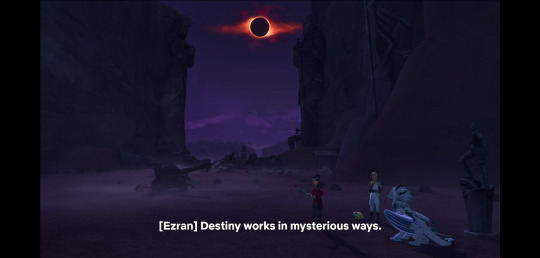
And with the story leaning heavily into destiny and prophecy as devices at the same time that Aaravos is getting back on track in his planned vengeance of fulfilling the prophecy of doom that made the cosmic council demand Leola's punishment... I suspect we'll see a lot more of "that prophecy rubbish," as Rayla puts it, going forward.
#the dragon prince#aaravos#callum#ezran#rayla#is in there too i guess#don't @ me to explain that aaravos's cockiness about callum is because dark callum in s7e6 was actually him in disguise okay#i am aware of that theory#kradogsmeta
37 notes
·
View notes
Text
Viren’s Path
This line here is probably the most significant for Arc 2 Viren.

“The path of freedom is the path of truth.”
On the surface, it seems counterintuitive. Freedom and truth shouldn’t have much to do with each other—especially when, in Viren’s case, choosing truth led him to willingly surrender himself and accept imprisonment in Katolis.
But the freedom that Viren is talking about goes beyond this. It isn’t about following desires or having unlimited options. It’s the freedom to act in accordance with who you truly are—its authentic autonomy.
Viren wielded more power than perhaps any human in history. Yet he was completely enslaved: by his desires (protecting family, serving humanity), his fears (losing Soren, losing control), and external manipulation (Aaravos’s influence). Even his original embrace of dark magic was driven by desperation to save his dying son. Every choice emerged from compulsion, not genuine freedom.
But after entering his dark magic coma and being forced to wrestle with his own mind, Viren finally comes to know himself—his own truth. In realizing this truth, he becomes free to act according to his principles: returning to Katolis to face justice, and ultimately correcting his cowardly decision from Season 1 by sacrificing his own life for the kingdom. And this is honestly one of the biggest parallels he has with Callum - Callum has been walking the path of freedom for over two years now, since learning the Sky Arcanum or at least since Harrow’s letter. With Callum, this freedom leads directly to truth - Once Callum determines what's morally right, he acts with remarkable consistency and integrity, even when it's difficult or dangerous. Even when it would cost him his life.


In both instances, Callum and Viren are willing to sacrifice their lives entirely on principle, demonstrating that they do have free will. Aaravos’s manipulation depends entirely on exploiting basic drives—hunger, curiosity, fear, desire. His control works by making his targets predictable through their compulsions. But as both Callum and Viren show, morality confounds and breaks this dynamic completely.
When someone acts on principle rather than impulse, they become genuinely unpredictable because they’re operating according to internal moral logic that Aaravos cannot account for nor understand. This is why when Callum attempts to use dark magic in a way that would sacrifice his life, Aaravos is genuinely surprised and caught off guard
The deeper question these characters explore isn’t whether humans have free will in the abstract, but whether we can exercise free will when resisting systems of control and oppression. The series reveals how those with power maintain dominance: by controlling both sides of conflicts, creating the illusion of eternal struggle, and convincing dissenters they are powerless—caught in loops without end.
The show’s radical conclusion is that through freedom, truth, and moral courage, you can indeed choose your own destiny. But only by stepping entirely outside the predetermined scripts that power depends on.
22 notes
·
View notes
Note
Do you think griffith is a victim of fate? And does berserk intend for the concept of free-will to be read as an illusion?
First question: actually no, not really.
Like on a very literal level yes, he technically is, but in Berserk literally everyone in the world is a victim of fate. So it's essentially meaningless to say he's a victim of fate whose life was railroaded and who didn't have any choice. It's true, but like, it's true of Guts, Casca, Judeau, random refugee #523 in the Conviction arc, some villager getting eaten by a dragon, etc. No one has defied fate so far in the story, not even the characters who theoretically have the power to do so, and fate dictates everyone's lives, not just the super special destined gods and their friends.
The Idea of Evil exists to provide a reason why bad things happen, because humanity wants someone to blame and willed it into existence. So presumably it's the reason for everything, from famine and war to some peasant accidentally breaking his leg. Everyone's lives are beholden to fate.
But that's boring. No one gets invested in automations walking around like wind-up toys, without a will of their own. No one would care about those characters. So Miura writes fate in a very hands-off way. Fate doesn't possess people and make them make certain choices despite their personalities, fate just makes sure they have experiences that shape them into the sort of people who would make certain choices.
Griffith is the type of person who would say yes to the Godhand's offer in the circumstances they offered it to him. That's why the sacrifice scene is so good - it's the perfect cumulation to everything we've seen of his character. It feels completely organic. We've learned everything we need to know about Griffith to understand why he chooses the sacrifice. If he felt like a victim being forced to sacrifice everyone with a metaphorical gun to his head, it wouldn't be an effective scene imo. Instead it feels like his free choice, and it works perfectly that way.
So I guess I've also answered question two along with this. I do think free will is essentially an illusion in Berserk.
I think it would make sense if the story climaxed in a paradigm shift for humanity which changes their priorities and ways of thinking and destroys the Idea of Evil and the concept of fate, so maybe something like that will happen. But until then, yeah, no one really has free will.
Even the characters who Skull Knight describes as being like a fish who can leap out of the water, capable of defying fate - Guts for instance, because of the brand - haven't done so at all yet. They're clearly still very influenced by fate day to day, as evidenced by Guts carrying a behelit for example, or Guts and Casca facliitating Griffith's resurrection during the Conviction arc.
Thanks for the ask!
22 notes
·
View notes
Text
I may be too old to be part of the campus protests going on now, but I have the utmost respect for these students and supporters.
The kids in their first years of college? They were born in 2004-6. They were kindergarten age when Sandy Hook happened. They were in junior high when covid hit. They are struggling to choose a path to education that doesn't put their own lives or entire vulnerable populations at risk.
I was born in 1990. The first instance of school violence I knew of was Columbine, and I was 9. The first instance of terrorism or threat to my "normal" was 9/11, and I was 11. My first indication that the US might not be the altruistic big brother of the world was the invasion of Iraq in 2003, I was 13. The first time I realized that family financial situations can change unpredictably, was 2005 (parental medical issues, followed by 08 crash), and I was 15. My first experience being the victim of police brutality was in 2007, I was 17. The first currently-happening protests I knew of were Occupy Wall Street in 2011, I was 21. The first ongoing attempts at revolution I was aware of were Arab Spring in 2012, I was 22. I was in my 30s when I learned colleges support genocide and the military industrial complex. For the first three decades of my life, I was able to convince myself the system was working and progress was happening, at a snail's pace, but nonetheless.
These kids have NEVER existed in a world that felt safe, have never had a future that seemed secure, have never even lived the illusion of the American Dream. The kids who are trying to choose a college that doesn't support genocide were the first kindergartners to do active shooter drills, how do they choose which university to allow to point guns at them? These were the first kids to have to live through, and study the historical impact of Covid, and they saw that the economy is valued above all else. These kids lost their virginity or came out of the closet in a world that was getting safer only to have healthcare taken from them. The world has failed this generation so intensely, and I can only hope y'all hold society accountable.
I have a child now, a true Gen Alpha Honey badger, and I am so hopeful that gen z can lead the charge to making sure my child doesn't have to face these same choices. Go forth, we got your backs, I'm too old and disabled to be front lines anymore, but I'll show up with snacks and do the jail release runs. I'll babysit and cook for when y'all get back from your actions.
#gen z#palestine#columbia university#boycoy divest sanction#the trauma generation fr tho#feral empathy#crossgenerational support#millennial protest mom I'll bring snacks and a first aid kit#lmk what else you need though#happy to help even if i dont understand yalls style or humor or music#solidarity in numbers#millennials#gen alpha
130 notes
·
View notes
Text
Got bored, so I’m sharing this Beyblade Burst Fantasy AU I made. It’s basically instead of beys they fight with weapons like the Rusalka!Valt AU but I lean even further into mythology.
It’s been a while since I last watched Beyblade Burst, and most my research is done on Google/Wikipedia/Other media so do forgive my interpretations.
The first character I altered for this AU is obviously Shu Kurenai. Generic choice, I know.
- Let’s start with a creature explanation. Spriggans are the ghost of giants, who have become fae adjacent through their allegiance to the fae. Despite the unpleasant exterior(s), they’re very serious about their job as guardians of whatever location they picked. If you’ve watched The Ancient Magus Bride, you know what they’re like. They also embody natural disasters as part of their power.
- The other part are Changelings. You all know of the “fae steals children and put something else in its place”, so changelings aren’t a species but more of a thing they do.
- The changeling could actually be an old faerie looking to be cared for by humans, in which case you can put it in the stove or oven, and crank that heat to the max. It’ll return your child and leave
- On the other hand, it could actually be a fae baby, this means the “cook the child” method won’t work and you’ll have to basically raise it and wait until the swapper deemed it adequate and return your kid. Changelings will get out of your hair eventually either way.
- With the creature explaining done, we shall move onto what happens to Shu. Or what he is.
- Despite the many security efforts, changelings still occur. Children being replaced. Whoever Shu’s real parent was didn’t even try to use illusion to hide his white hair and red eyes. This did not save the Mr and Mrs Kurenai any grief. Begrudgingly, they try to raise him, holding onto the hope their real child will be returned to them if they did enough
- But as you will see (with potentially more than 3 characters, seriously where the hell are the parents of these bladers), they could not love him. He is why their child is now off some place they could not reach. The white hair and red eyes a constant reminder he is not theirs. It became far too much, til they averted their gaze almost entirely.
- Growing up, it was very easy for Shu to figure out his parents did not love him. It wasn’t hard to reference when his best friend Valt has such a tight knit family. The absence of his (foster) parents are the root cause of Shu’s independence. It’s fine though, he can fill the missing void with something else
- Shu isn’t a huge fan of showing his fae side in S1 and it’s rarely seen. But to describe his fae traits, roots and tree branches grow from his body, with 2 of them forming horns growing on his forehead. An even rarer instance would be him blooming, as flowers blossom from the branches. I have yet to decide why this happens.
- He is a unique mix of wood and flame, but uniqueness is not enough to beat a certain White Tyrant. His flame simply wasn’t strong enough to counter that
- You know what happens :)
- When S2 rolls around and Red Eye happens, a great red flame had covered his battle form. Gone are the calm branches, now, only vengeful flames of wraiths remain. A thick, black carapace that’s like charred wood grows on his arm. This is the result of Shu’s tunnel visioning into vengeance, and Theodore Glass’s glass abu- I mean, experiments.
Red Eye, the Spriggan that embodied forest fires, wielding an axe named Requiem. That is Theodore’s creation born of setting ablaze a desire for power.
(Read: Theodore barely did shit other than amplifying the fire affinity Shu already has, this is bad. One needs time to gather firewood to burn, and no one gave the tree that grew too tall for itself time to expand, including itself)
- This is why Valt just couldn’t believe Red Eye is his friend. As far as Valt knows, Shu’s flames are something super careful, warm, not rampaging and… whatever this is. Maybe it’s also the fae illusion Red Eye subconsciously conjured by passionately rejecting his former identity. He is bringing up all the repressed Spriggan aggression to the surface, and it’s doing no one any good.
- He thought no flowers would bloom on his person again, as wilted as he is
- After that debacle, some therapy, returning to Beigoma, Shu decides to finally get out of his parents’s hair. He wishes them luck in finding his own son, that he’ll provide support. He doesn’t know what they think of him now, but it no longer mattered the moment he took his luggage with him to America again.
- As per actual medical expert’s advice, he was told to limit his use of fire. This may or may not lead to him discovering what he did as Red Eye was just an attempt to mimic his first traumatizer, that a rampaging flame was not him at all.
- With himself as the candle, branches as the wick, flames emerge as new flowers and petals.
- One day, he found that his flames won’t burn what he doesn’t want it to. It was only warm to those who dare touch it.
- Some time, before the events of Surge, Shu’s power suddenly got stronger (he healed well enough), which resulted in the flames getting stronger out of nowhere, and subsequently burnt his hair. Thus, he had to cut it short.
Longest post I made in a while. Whew. All this because I enjoy what fire will look like, resting upon a tree branch in strange peace. I am open to naming suggestions for this AU
15 notes
·
View notes
Text
ACOSF could have foreshadowed a rejected mating bond, a fake bond, or even a two-mates theory if SJM had chosen to explore those possibilities with Neris, simply by canonizing a mating bond between Eris and Nesta.
For the two-mates theory, SJM could have had both Eris and Nesta experience two mates each. For instance, Eris could have a confirmed bond with Mor and later develop a second bond with Nesta. Similarly, Nesta could have had both bonds snap simultaneously, giving her a choice between two mates. Eris’s situation would then prove that a second bond can manifest without requiring significant passage of time.
Mor and Nesta could have mended their grievances more effectively, particularly if they both shared Eris as a mate. Mor could then have shared her reasons for rejecting the bond. This setup could have also demonstrated that mating bonds don't necessarily involve the same three individuals. For example, Nesta wouldn’t be mates with Mor, nor would Eris be mates with Cassian. Instead, their second mates could be entirely different individuals.
For a rejected bond, SJM could have written Eris as Nesta’s mate, rejected in favor of Cassian. This would have proved that love does trump over the mating bond.
For a fake bond, Eris’s proximity to the Cauldron, Koschei, and Rhys could have created the illusion of a bond with Nesta. The Cauldron might have used Eris to manipulate Nesta into returning her stolen powers, Koschei could have leveraged him to lure Nesta into his side, or Rhys could have orchestrated their union to secure Eris’s loyalty. After all, Eris did propose to Nesta. Rhys would simply have needed to seal the deal as a political strategy.
Any of these possibilities could have served to minimize the significance of the mating bond in Prythian, showing that it isn’t as absolute as it seems.
However, SJM ultimately used Eris as a narrative device to bring Nesta and Cassian to confront what was holding them back from fully embracing their relationship—a confrontation that culminated in the snapping of their bond.
These theories are often used to minimize the bond between Elain and Lucien, suggesting that Elain’s story would focus on breaking free from the bond and replacing it with love and choice. Yet, SJM has consistently written characters who view the mating bond as precious, worth the heartache and trials they endured before meeting their mates.
In every instance where SJM wrote forbidden relationships, they ended in either death or separation. Except for Rhys and Feyre, whose mating bond was the very reason they were both brought back from the dead.
SJM continues to connect Lucien to the central story. He remains engaged with the Night Court’s affairs, directly involved in conflicts Rhys seeks to resolve, while Elain’s potential role in those resolutions is subtly foreshadowed.
This fits SJM’s storytelling pattern: two characters with similar dispositions working toward a shared goal, where the female often holds the key to its resolution.
24 notes
·
View notes
Text
Wicked: A Review
Alright, I've watched it like a billion times now. And now I have really figured out what I think about this movie.
Lets get the simple good stuff out of the way:
I really love the little details that have went into this movie, the world building, the well-done CGI, basically all the visuals are incredible. The costume design is whimsical and fun, giving a lot of character to the movie. (although I think the asymmetrical buttons on the green jacket that Nessa wears at the beginning is really unflattering, just because it gives the illusion that shes sitting in her chair uncomfortably. She slays like every other look tho so it gets a pass lol.)
I also love the larger inclusion of animals in the movie, giving more reasons to sympathize with them (live, laugh, love Dulcibear). The music is incredibly well written, and I feel that 90% of the music carried over really well into the movie. The scene that really stood out to me in this movie HAS TO BE the dancing scene in the Ozdust Ballroom, the music being silent, then swelling and changing as Glinda joins in. Elphaba CRYINGGG?? it gets me every time.
Now onto the more wicked stuff:
HOWEVER, I think that the 10% that does NOT carry over well is incredibly apparent and even hurts the movie. I think that the spoken parts of the music, namely in No One Mourns the Wicked, where the movie just lets the music cue play, having the governor whisper the word "green." In my opinion, it takes a lot of punch out of the lyrics, and how looked down upon she was at birth. This happens at various times in different songs throughout the movie, but this feels like one of the more obvious and somewhat distracting instances. (Of course this excludes the parts that were written to be spoken, most prominent in The Wizard and I).

Elphie/Erivo
Another major issue I have with the changes to the music comes from how, specifically Cynthia Erivo sings some of the more iconic parts. I know we've all heard the iconic riff, but I wouldn't have a problem with the way she sings it if the movie didn't stop breaking the momentum that part of the song purposefully builds. They keep cutting Cynthia off, breaking the tension, then expecting the audience to care when they try to go back to where she was. When in fact, the would need to rebuild that climax all over again. Now that part of the movie feels more like waiting, impatiently and bored, for her just to do the thing. Rather than being on the edge of our seat, anticipating. And dont even get me started on the "it's MEEEEE" in Defying Gravity
My final gripe with the movie regarding Elphie is her friggen visions. Do they effect her or not? Can she physically see them or are they in her head? I need to movie to stick to its own logic PLEASE. Because in The Wizard and I, she sees the vision on the statue of the Wizard. However, later in the movie while outside Dr. Dillamonds house, it seems so powerful that it knocks her back, and she sees it in her head now. I totally respect that this movie may be making a stylistic choice with her visions, but I really need to know if this is a magic thing she can do (as the Dr. D scene implies), or if its just her being idealistic (Wizard and I).
Erivo does a great job both acting and singing as Elphie. I do think some of her riffs are a little over-chewed, but who can blame her? Such an iconic role, I'm sure she just wanted to leave her own personal mark on it. (and I personally think her "maybe some of us are just different" bit in the first scene with Dr.Dillamond is hard to watch shes #notlikeothergirls. It could've been delivered more as a crashout to make it more compelling imo) However, there is one scene in particular that completely destroys some of the humor of the original musical. Humor that helped keep the whimsical nature of Oz prominent throughout the original show. Right at the beginning of Loathing, where Glinda and Elphie are writing to their respective parents, has the fun moment where Glinda tries to describe Elphie. And Elphie simply describes Glinda as "blonde." In the musical this line was used as a device to encompass how that seemed to be the only word to encompass how annoying Glinda is to Elphie. In the musical, Elphie says it like "shes just a typical blonde," making her seem like a walking eye-roll for Elphie. However, in the movie this line is flippant, a simple fact. Glinda is just blonde. I think that the line delivered this way implies that Elphie doesn't really concern herself with Glinda. Which goes against the next 15 minutes of what the movie describes. The movie shows them feuding, shows how Elphie talks mad shit to Nessa, and yet shes just "blonde" to Elphie?

Glinda/Grande
I really miss the yellow dress, I cant lie. I feel that the change from yellow in the beginning of the first act to her iconic pink during/after the Ozdust Ballroom (Dancing Through Life) strips some subtle character building from her. The yellow in the beginning helped show her off as a flat, blonde, rival. But then when she really connects with Elphaba she changes inside and out. She becomes pink, a mix of colors, as opposed to a primary, simple one. She becomes a more complex character that we as an audience see differently.
Side note: I also think that she is too platinum blonde, it really washes Ariana out, making her seem vaguely beige in comparison to the vibrancy of Elphie. And throughout the movie, it doesn't change with her, which I think the change to pink from yellow would have really helped to highlight.
I know that this next one is really about to make some stans very mad. I think that Ariana is just not camp enough to be Glinda. I know, and I'm sorry to all her stans, but I think that she was just really flat to watch in comparison to Cynthia. While I think she has some shining moments like "I didn't get my way" causing her to be carried by her side-character friends, or "I can't hear your responses because this is a letter," there are far too many moments where the jokes or subtle silliness of Glinda has falls short. (then when Kristen Chenoweth comes out it really feels like a smack down on Grande tbh, the MOUTH SMACK WAS SO FUNNYY)
Example: When Glinda and Elphie are exchanging secrets after Dancing Through Life, there were so many opportunities for her line delivery to be expressive and out there. But instead she says it all in one sentence in the same tone. "okay I'll go first" could've been delivered in a more, begrudging silly way, to emphasize that she really wants to go first. Rather than said in one flat tone. I think it really would have given Glinda more character, and more chances to become a sympathetic person for the audience to connect with.
Now, I hear you all chanting: "SHE WAS FUN IN POPULAR!!"
And you are SO right. Popular is really her chance to shine, and to be silly, over the top, etc. And she does take this chance, but this feels like a glimpse into the Glinda we could've had. In the scene afterward, Glinda is back in her muted pink uniform, washing her out again, not even a glimpse that shes different from her experience with Elphie aside from the fact that she sits with her now.
Now I hear you chanting once again (damn yall stop yelling): "MAYBE SHES ONLY BOISTEROUS AROUND ELPHIE, SOCIETAL PRESSURES MAKE HER ALL DEMURE AND MUTED, ETC"
AND TO THAT I SAY i disagree. The train scene shows Glinda being the same amount of expressive as she was in the BEGINNING OF THE MOVIE. She talks more but at the same tone/level, AND HER CLOTHES IN "ONE SHORT DAY," WITH NO OTHER CLASSMATES AROUND ARE STILL MUTEDDDD. I know that this movie is meant to try to tone her down a bit so that she doesn't come off as completely ridiculous.
HOWEVER I really think it means that we lose a lot of her character, and we lose what makes Glinda a fun sympathetic character. In the movie she's less lovable because she's less silly, making it harder to feel like we're losing an integral part of the story when she leaves Elphie. ESPECIALLY in her costumes, the vibrancy was such a wonderful contrast to Elphie's dark black clothes. I am so sad they nerfed my comphet girl. These changes make Elphie and Glinda's split feel very different. In the musical it really feels like they've changed eachother. Whereas in the movie, we see Elphie change, but Glinda barely seems different (thanks to the lack of drastic/noticable costume changes #bringbacktheyellow, and the fact that she seems muted in tone with classmates, AND the Wizard/Madame Morrible).
I truly hope that for the second part of the movie, she really shows this contrast off better (spoiler alert), between how happy she was being best friends with Elphie to how sad she is to put on a happy face for the people of Oz. I really hope she allows herself to act more out there, just as her side character friends do, and just as how Elphie/Cynthia even acts at times.
GELPHIE
alright, now that all that's out of the way, i feel that it is incredibly important to mention that I am a GELPHIE TRUTHER. Glinda is the only one who truly knows that Elphaba DOES care what others think, and dances with her. Glinda is the first to accept Elphie and to call her beautiful.. I know that Fiyero becomes more developed in the next act, and maybe it will convince me to accept the heteros (/j). BUT if it follows the musical (as it almost definitely will), GELPHIE all the way.
"maybe you're not as powerful as you think you are." Is one of the most heartbreaking lines in the movie for me. And not because Glinda is "being mean," but because it sounds likes she's hoping that Elphie isn't. She doesn't want Elphie to go, she doesn't want to shake up the world. She wants to be able to be WITH her. But she can't take that leap. She can't go against everything she knows, sending her with a cape into the world during Defying Gravity.
Despite being different people on different paths, they truly accept each other, and make each other better people.
If that isn't a love story then I don't know what is.

If you read all of that THANK YOU. I hope you enjoyed my takes or at least got the chance to see the movie from a different perspective. While this movie has some issues I think it was practically perfect.
TLDR:
Casting: 8/10
Costumes/set design: 9.5/10 (the Ozdust Ballroom is STUNNING)
Singing: 10/10
Adaptation from Original: 9/10
Overall: 9/10
#wicked 2024#wicked#movie review#movies#wizard of oz#fuck boq#elphaba thropp#glinda upland#wlw#sapphism#god i love women#gelphie#cynthia erivo#ariana grande#moviegifs#musical theatre#wicked the musical
17 notes
·
View notes
Text
The Last Unicorn: The Darkest Fairytale about the Most Kid Friendly Creature on Earth

Before My Little Pony, Barbie, Lisa Frank stickers, and the booming unicorn trend of the 2010s, there was a darker tale of the unicorn, which no one could possibly imagine. Peter S. Beagle wrote the Last Unicorn, of which he also oversaw the filming and animation of his work. To this day, he had produced multiple sequels and inspired works of fairy tales. However, I personally felt drawn to this one.
There is a great melancholy to it, an iconic impact, similar to the tales we know from the Grimm brothers and Hans Christian Anderson. It reminds me of the Grimm version of The Little Mermaid, a tragic tale of a hopeless romantic that never got the guy and dissolved into sea foam.
Except, you could say Beagle's story had both the sadness of the original but the triumph of Disney's version.
Like my three part essay of Jack and the cuckoo clock heart, this one will have separate parts as well. I am still deciding if I settle with three—oh well, we will have to see.
I will study the three iterations (the original book, the film, and the vision comic) and deliberate from there. STAY TUNED AND MAJOR SPOILERS AHEAD.
I was probably too you to understand the significance of this film, but I recognized the melancholic aspect to it immediately. From the choice of tones, colors, and story. There was only one "comedic" moment and wasn't even the butterfly's nonsensical ramblings. Tell me why did the magic tree do him like that😅.

But I digress. The Last Unicorn is truly an interesting story because, to this day, it is still talked about in video essays, reddit threads, and comment sections under the posted clips of the movie.
It is unique because we usually don't associate unicorns with a tale that would mostly suit an elf story. They are always magical happy creatures, or in recent media, either aggressive animals or pests (in the movie Onward). But they were never depicted like a tragic figure.
I assume that there will be readers who may not have seen this and are interested in checking it out. Please check out the movie on YouTube. It is entirely free!
Now, to my actual content, I noticed differences in the book, the film, and the visual novel.
First, the film, of which is much more familiar to most, and the visual novel (which references the book directly). In the first two parts, I will be referencing the film and visual novel. By the last part, I might mention more of the original book.
Just a few notes ahead:
The Unicorn and Amalthea are two different versions of the same character. I will refer to her original form as a capitalized Unicorn and for her human form as Amalthea
Film: Butterfly serves as a catalyst for the Unicorn to search for the others.
Visual Novel: The Unicorn meets the butterfly after she leaves the forest. However, it still serves as a messenger.


I did prefer the film's plot structure with this. It just made more sense for the Unicorn to ponder a little more about what the hunters said in the beginning of the story and have a catalyst come to push her to a quest. The butterfly (molded after Beagle in the film) did just that. He gave her an omen, a thought that may be closer to truth than just a bothering comment. She needed multiple information for her to just up and leave her forest.
The visual novel portrayed the inner monologuing of the Unicorn, which immediately prompted her to wander off to find more of her kind. It was the butterfly's role to intensify her search as they may be in danger. It's just that the timing was off in the original tale. Why would she leave with one instance, right?
Anyway, I did find this a good choice.
Film: Mommy Fortuna's carnival featured a few illusions as well as two actual ancient creatures: Celaeno, the Harpy, and the Unicorn.
Visual Novel: There were two more— a spider who believes she is Arachne, and Elli, which is just Mommy Fortuna, in disguise.


The Last Unicorn also has another reoccurring theme: profound and deep statements, stories, and passages. The spider is sold on the master's illusion. She truly believes she is Arachne, and when the Unicorn was freed and attempted to free the others, the spider begs to stay deluded. Mommy Fortuna's disguise as Elli might just be another way to generate more income.
Film: A unicorn turning into a human was introduced to us directly through Schmendrick turning the Unicorn into Amalthea
Visual Novel: Schmendrick introduces this spell long before Amalthea—in a form of a story

Schmendrick talks so much more in the visual novel, a lot more stories. The film did mention that he was older than he seems, but the visual novel really hammered this home through his vast knowledge.
He told a story where a great wizard, Nikos, turned a unicorn into a male whilst saving it from three hunters. The unicorn was on the lap of a virgin maiden at the time. When it turned into a man, he eventually decided to live with the maiden, for quite a long time too. Though married, they did not have children. The Unicorn commented that the wizard likely trapped the unicorn in a "burning building," which would have been worse than death by the Red Bull.
Film: Schmendrick has two tones, his self-boasting and his caring and understanding tone brought from his actual age
Visual novel: He was surprisingly also juvenile—like a sassy Young Sheldon

It was just funny to me that this moment was so different from the film. He was much more gentle to Molly but also so Schmendrick of him to also be forbidding (almost scolding) Molly to join them in such a boastful tone when referring to himself. It was even funnier when I read the visual novel, hands on his hips like a sassy little nephew saying, "She's not here for you girl".
Film: Molly was visibly middle-aged, sassy, and emotional.
Visual Novel: Molly looked a tad bit youthful, probably to visualize some purity in her heart?

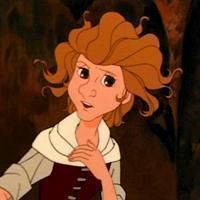
Well, Molly was just as direct as she was in the movie, but looked a little more youthful. I just might analyze this with character tropes in terms of design, Like how heroes have capes, villains have green eyes, or how wizards have pointy hats. But that's another topic. Anyway, I think her appearance in the novel just subtly hints her personality and her pure heart? As told in the novel as well, the only people who see these magical creatures are magicians, other magical creatures, animals, and virgins. Obviously, I don't think Molly is a virgin (I don't mean it in a bad way, but she also kind of hints this), but other than purity, maybe her pure belief that unicorns exist? Similar to the concept of the Rise of the Guardians, when belief enables children to see the Guardians.
Just a thought. There is a lot of food-for-thought in this story.
(There are mooooreee comparisons, it's just that this is getting too long, let's save it for the next post;))
#last unicorn#movie#blog#movie blog#opinion#movie adaptation#visual novel#essay#essay writing#movie opinions#lady amalthea#schmendrick#peter s. beagle#the last unicorn#fairycore#fairy aesthetic#fairy tales#nostalgia#nostaligiacore#dark tales#dark fairytale#dark fantasy#fantasy#unicorn#molly grue#the red bull#king haggard#prince lir#transformation
12 notes
·
View notes